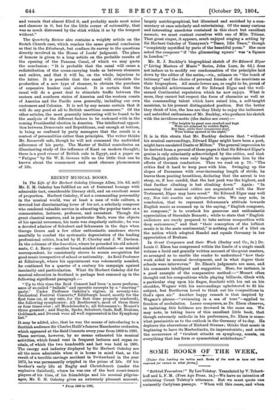In The Life of Sir Herbert Oakeley (George Allen, 10s.
6d. net) Mr. E. M. Oakeley has fulfilled an act of fraternal homage with admirable tact, considerable literary skill, and an excellent sense of proportion. Herbert Oakeley, if not a commanding personality in the musical world, was at least a man of wide culture, a devoted but discriminating lover of his art, a scholarly composer who rendered valuable service in educating the popular taste as a commentator, lecturer, professor, and executant. Though the great classical masters, and in particular Bach, were the objects of his special reverence, his taste was singularly catholic; he was a devoted admirer of Schubert and Schumann in the days when George Grove and a few other enthusiastic amateurs strove manfully to combat the systematic depreciation of the leading professional critics, hcaied by H. F. Chorley and J. W. Davison. In the columns of the Guardian, where he preceded his old school- mate, C. A. Barry—another broad-minded enthusiast—as musical correspondent, he consistently strove to secure recognition for good music irrespective of school or nationality. As Reid Professor at Edinburgh, where his appointment was vehemently assailed, he continued for a quarter of a century his campaign against insularity and particularism. What Sir Herbert Oakeley did for musical education in Scotland is perhaps best summed up in the following significant paragraph :— " lip to this time the Reid Concert had been 'a mere perform- ance of so-called "ballads" and operatic excerpts by a "starring" party.' Under Professor Oakeley's regime, in seventy-two Orchestral Festival Concerts,* Edinburgh heard, mostly for the first time (or, at any rate, for the first time properly rendered), the following symphonies : All Beethoven's, most of them three or four times over ; all Mendelssohn's ; all Schumann's ; Mozart's three greatest; and Haydn, Spohr, Schubert, Gade, Raft Brahma, Goldmark, and Dvorak were all well represented in the Symphony list."
It may be added, also, that he was the means of introducing to a Scottish audience Sir Charles Halle's famous Manchester orchestra, which appeared at the Reid Concerts every year from 1869 to 1891. These services, however, by no means exhausted his musical activities, which found vent in frequent lectures and organ re- citals, of which the two hundredth and last was held in 1891. The energy and industry displayed by Sir Herbert Oakeley are all the more admirable when it is borne in mind that, as the result of a terrible carriage accident in Switzerland in the year 1872, he was permanently crippled in the prime of life. Of his brother's early life at Rugby and Christchurch (under the explosive Gaisford), where he was one of the best court-tennis players of his time, of his friendships and his musical pilgrim- ages, Mr. E. M. Oakeley gives an extremely pleasant account,
• From 1866 to 1591.
largely autobiographical, but illumined and enriched by a com- mentary at once scholarly and entertaining. Of the many curious and interesting anecdotes contained in this short but excellent memoir, we must content ourselves with one of Mlle. Titiens. That great singer, it appears, much enjoyed singing a setting by Sir Herbert Oakeley of Tennyson's "Tears, Idle Tears," though "completely mystified by parts of the beautiful poem." She once asked the composer " if `the glimmering square' was 'a Square in London. "


















































 Previous page
Previous page